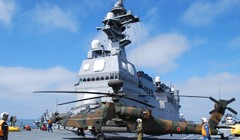In contrast to the Trump Administration’s concerns about some NATO members, notably Germany, not doing their fair share for mutual defense, the White House has been pleased with Japan’s efforts to counter the growing threats from China.
The U.S. – Japan Security Consultative Committee, with the participation of Secretary of State Mike Pompeo, Acting Secretary of Defense Patrick Shanahan, Minister for Foreign Affairs Taro Kono, and Minister of Defense Iwaya met in Washington on April 19. The two nations agreed to continue to play an “ indispensable role in upholding a rules-based international order and promoting their shared values, noting that their strategic defense policies aligned with each other.” The United States reiterated its commitment to the defense of Japan through the full range of U.S. military capabilities, including conventional and nuclear.
The participants “affirmed their strong commitment to realize a ‘free and open Indo-Pacific,’ a shared vision for a region in which all nations are sovereign, strong and prosperous. The U.S.-Japan Alliance serves as the cornerstone of peace, security, and prosperity in the Indo-Pacific region and remains iron-clad amid an increasingly complex security environment…[they] reaffirmed their commitment to maintaining readiness to face threats in the Indo-Pacific region, and discussed tangible ways to implement the National Defense Strategy and Japan’s National Defense Program Guidelines. Both parties agreed to enhance alliance capabilities and interoperability across the conventional, cyber, and space domains. Secretary Shanahan expressed appreciation for Minister Iwaya’s leadership, which has further strengthened the alliance and helped to ensure a free and open Indo-Pacific region.”
In a thinly veiled reference to China, both Washington and Tokyo expressed concern about “geopolitical competition and coercive attempts to undermine international rules, norms, and institutions present challenges to the Alliance and to the shared vision of a free and open Indo-Pacific.” In return, they stressed the need to deepen regional cooperation, led by the U.S. and Japan. They also noted the rapidly evolving challenges in space, cyberspace, and the electromagnetic spectrum. In response, they pledged to deepen their joint endeavors to counter the threats.
In a highly important specific area, the two nations “affirmed that international law applies in cyberspace and that a cyber attack could, in certain circumstances, constitute an armed attack for the purposes of Article V of the U.S.-Japan Security Treaty.”
Support was expressed for Washington’s attempts to negotiate an end to the North Korean nuclear and missile threat, a topic of key concern to Tokyo. North Korean missiles have been launched in test flights near Japanese territory. Both nations noted the importance of their joint efforts, including those of South Korea, to maintain peace in the area. Cooperation with Australia, India, and the ASEAN nations was emphasized.
The discussion included a number of specific recommendations, including:
- Deepening cooperation on space capabilities
- Bolstering capability and enhancing their respective integrated defense for both air and missile threats, including through the timely and smooth deployment of Japan’s Aegis Ashore.
- The importance of modernizing and adapting the Alliance’s capabilities to meet both current and future needs, including through the introduction of advanced weapon systems to Japan such as F-35, E-2D, V-22, stand-off missiles, and Aegis Ashore.
- The two nations will promote the standardization of defense equipment, sharing of defense networks, and cooperation on emerging technologies.
- Both Washington and Tokyo will strengthen and enhance information security practices across the whole of government to protect classified information, maintain technological superiority, and preserve our shared economic and defense advantages in the face of evolving threats to the Japan-U.S. Alliance.
- The U.S. and Japan will deepen operational cooperation as a means to improve Alliance readiness, interoperability, and deterrence, including the steady implementation of mutual asset protection; bilateral presence and joint Intelligence, Surveillance and Reconnaissance operations; increased scope of logistical support under the Acquisition and Cross Servicing Agreement; and ongoing exchange of liaison officers.
- The two Governments will promote joint/shared use of the facilities of the Self-Defense Forces of Japan and U.S. Forces, in addition to operational training areas, to enhance interoperability, deterrence, and response capability, and to build a stronger relationship with local communities.
Photo: AH-64D helicopter boarding a MSDF destroyer in support of island landing operations (Japan Self Defense Forces)
